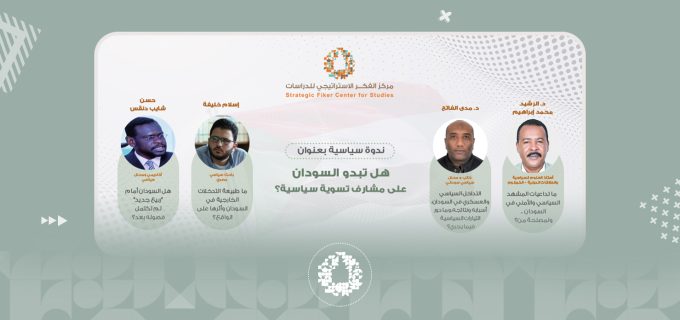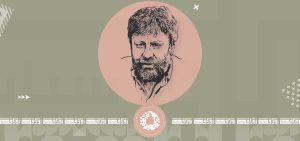The Strategic Fiker Center for Studies held a political symposium entitled “Does Sudan appear to be on the verge of a political settlement?”, on Monday, 29/11/2021, in the presence of specialists in Sudanese affairs, within four main axes discussed by the Center to determine the nature of the current political, security and economic conditions in Sudanese lands, and the consequences of that on the Sudanese scene locally, Arably and internationally.
Speaking about the repercussions of the political and security scene in Sudan, Dr. Al-Rashid Muhammad Ibrahim, a professor of political science and international relations in Khartoum, said: “The Sudanese scene is wide and open to all sides, and the recent Sudanese revolution is completely different from what the people of Sudan knew in the 1964 and 1984 revolutions. What differs in it today is that the Islamists were running the government, and it was also short compared to the rule of the rescue phase, which extended for many years at the time.
Dr. Al-Rasheed indicated that the Islamic current was strongly present in the Sudanese scene, adding: “The Islamic movement was the ruler of the country, and this is a very important variable to understand the reasons for the failure to achieve the gains of the revolution, and therefore the partnership between civil and military is coercion and not consent.”
He stressed the existence of many problems in Sudan as a result of the fluctuations of political and economic life in the past few years, and rather during the transitional period, adding: “The revolution came this time with the presence of armed movements outside the law, and this was not usual in Sudan.”
He continued, “From my point of view, the recent Sudanese constitutional document has many problems and shortcomings, as it was drafted in a hurry,” explaining at the same time that the recent Sudanese government relied more on the outside than on the inside, which exacerbated the country’s crises.
In turn, the Egyptian political researcher, Islam Khalifa, said during his participation in the topic “What is the nature of foreign interference in Sudan and its impact on reality?”: “Sudan since 1996 has been living in a state of economic siege and sanctions imposed by the American administration and made it isolated internationally, which led to exacerbate crises.
Khalifa pointed out that the recent Sudanese government headed by Abdullah Hamdok paved the way for Western and European countries to set foot in Sudan and interfere in its internal affairs, especially America, Russia and the UAE, which led Hamdok to monopolize the rule.
He stated that Western countries had supported the actions of last October 25, and sympathized with the choices of the Sudanese people, with complete disregard for the reality of the political and security situation in the country, in addition to the state of political fragmentation experienced by civil political parties and forces in Sudan.
The Egyptian political researcher believes that Sudanese society is politically mature, and has a vision and several scenarios to chart its future, adding: “It is very natural that external interventions in Sudan do not bring good, and the union must first be from the inside between the civil and military political forces, and present an internal vision to get out of the impasse. Present”.
In the same context, the academic and political analyst from Sudan, Hassan Shayeb, in his discussion of the topic “Is Sudan facing a new spring whose chapters have not yet been completed?” Most of the Sudanese political parties draw from one ideas, but differ in how they are implemented, and this has led to a split Many political forces draw clear and realistic visions of the Sudanese scene.
Sudanese academic Chaib believes that Sudan needs a strong strategic ally to help it manage the political, security and even economic scene, adding: “Yes, there is external interference in Sudan, and no one can deny it, but at the moment we need an ally, because all the ingredients for the failure of the state have become clear in Sudan.
Shayeb stressed the importance of Sudan’s geographical location in making it the focus of attention of several Western and Arab countries, and also an important axis in the international conflict, which made the United States of America intervene strongly in the political scene recently.
The center concluded the political symposium with a set of questions posed by participants from several Arab countries to the guests, the most prominent of which revolved around the extent of the recent Sudanese government’s seriousness in getting out of the current Sudanese political and security impasse, and whether the country is on the verge of a unified political vision, or will it resemble what happened in some Arab countries.




